Dieting & Weight Cycling can be dangerous
Weight cycling describes the continual bouncing and fluctuation of weight over periods of time in repeated attempts to intentionally lose weight. You can think of it as…. Lose weight, gain weight, lose weight, gain weight, lose weight, gain weight etc. We see a lot of people where frequent weight fluctuations in attempts to lose weight is common.
But what is the constant bouncing around of weight actually doing to us?
Weight cycling (the previously described) is associated with a shorter lifespan, and has been shown to increase the risk of diabetes, high blood pressure, high cholesterol and heart disease. In fact, the research shows that it is possible that the association between weight and health risk can be better attributed to weight cycling than body size! We now have access to research (and experiences) that showcase that it is the engagement of health enhancing BEHAVIOURS that contribute to better health outcomes, rather than the achievement of a particular body, weight, shape or size. And that IRRESPECTIVE of a body, weight, shape or size, a focus on health-enhancing behaviours is possibly healthier long-term than living inside a body that constantly weight cycles in the continual, exhausting effort to get a body smaller, and neglects healthy behaviours to get there.
Our attempts to intentionally lose weight are largely driven by diet cultures strong messaging that a small body equals a healthy body (which is largely incorrect), but forgets the notion that we all come in different shapes and sizes and our genetics also significantly affects our body size (to which, we have not as much control over as we are led to believe).
Weight stigma is harmful
Internalised negative attitudes about weight, known as weight stigma, is another mediator between body size and health. Studies show that weight stigma increases the risk of high blood pressure, metabolic syndrome, diabetes, high cholesterol, and eating disorders. This means that placing the focus of medical care on weight management is harmful and has the opposite of its intended effect on health. You can read more on how and why weight stigma drives the ‘obesity’ epidemic and harms health here, and evidence for adopting weight inclusive health policy here.
Dieting leads to eating disorders
Dieting is one of the strongest predictor factors for the development of an eating disorder. Prescribing diets often equates to prescribing disordered eating behaviours. Dieting can lead to severe restrictive eating and malnutrition, cycles of starvation and binge eating, as well as other eating disorder behaviours and their medical complications.
Weight loss pills and surgeries carry significant risks
Weight loss medications may lead to short term weight loss, but cause weight cycling in the long run, along with other potential side effects. Weight loss surgeries carry a significant risk of many complications, including death. The research shows that there are more effective ways to positively impact health that do not risk lifelong side-effects.
Why diets don’t work
Have a listen to the below audio, by Lindo Bacon, Health At Every Size (HAES), and Association for Size Diversity & Health (ASDAH).
OR you can watch the video instead, here.
Furthermore, have a listen to our Founder, Monique Jephcote, talk you through an excerpt from Tally Rye’s book ‘Train Happy’, specific excerpt reading is from Nutritionist & Author, Laura Thomas.
“When dieters lose their willpower, it’s a failure of the dieting system, not the person” – Elyse Resch
When you go on a diet, your need to assert your autonomy overrides and is stronger than your need to lose weight. This has to do with the internal violation that dieting represents. As an adult, you set up boundaries about what to think, what to believe in, and what to eat… In the world of dieting, the external rules of the diet crosses over into the boundary that protects all of your personal eating wisdom. The simple act of stepping across your personal, psychological boundary can trigger so many thoughts and feelings and actions of rebellion. You’re being told what to do, and you react against that. There is absolutely nothing wrong with you when you’ve ‘failed’ at a diet. Rest assured, you’re actually psychologically healthy.
Nutrition is a science, but eating is a behaviour.
The Evidence based framework – ‘Health At Every Size’ – is NOT saying “everyone IS healthy, no matter their size”. It IS saying, however, that our behaviours are far more predictive of our health outcomes than our weight (I urge you to challenge the cultural belief that weight = health).
Listening to the above (yes, all 9 mins!) video is a good start.
Diets don’t work because of the complex physiological & psychological processes that take place in our bodies when we restrict our calorie intake below our body’s needs. Our bodies can’t tell that we are in a voluntary food deficit, it just assumes that food is scarce.
What happens then? Have a listen to the above audios.
An understanding of the human body including its metabolic processes allows for one to understand quite swiftly why dieting and restriction doesn’t work long term. One may understand this but find it challenging to accept if we haven’t dismantled our own internalised weight stigmas / the role diet culture & the diet mentality plays in our own lives.
People & companies that insinuate that diets don’t work because of ones “lack of willpower or control” is so deeply misinformed that it’s genuinely painful to listen to.
The idea that if people were ‘controlled’ & ‘strict’ enough to stay on a diet, that “maybe if you were disciplined enough, then it could mean long term weight loss” is harmful, demoralising, and perhaps is a highly influencing factor contributing to a confluence of, paradoxically, health problems in our culture today.
This sort of thing is adding to a current epidemic of Eating Disorders (ED’s are psychiatric illnesses with Anorexia Nervosa = highest death rate of any psychiatric illness). Many people also believe Eating Disorders have a “look” and this is simply not true.
We’re in a crisis, and diet culture & weight stigma are at the forefront.
Some final food for thought…
What’s the very opposite of not staying on a diet for the rest of your life?
OR
What would it mean to be staying on a diet for the rest of your life?
It would likely mean upholding eating disorder or disordered eating behaviours. And in what world, is that representative of health? And yet, our culture almost endorses this. We have a deep amount of work to do.
You can start by reflecting on any internalised weight stigma you hold, and if a diet mentality is present in your life (reach out if needed, our door is always open at CFIE!).
Dieting (in all of its sneaky forms) = disconnection. So, rest assured, you are psychologically healthy if you cannot stay on a diet.
“It would be one thing if dieting was a pain in the ass but it worked, but it doesn’t even work.” – Evelyn Tribole
And if diets worked, why would we need so many of them? By the time you’ve added all the diets that exist together, there’d be nothing left allowed for you to eat.
Time to throw dieting in the trash can & learn how to eat for yourself without a side of diet culture. This is pretty well the most solid decision you could make for your health!

WRITTEN BY MONIQUE JEPHCOTE
Accredited Practising Dietitian + Certified Intuitive Eating Counsellor

WRITTEN BY MONIQUE JEPHCOTE
Accredited Practising Dietitian + Certified Intuitive Eating Counsellor











